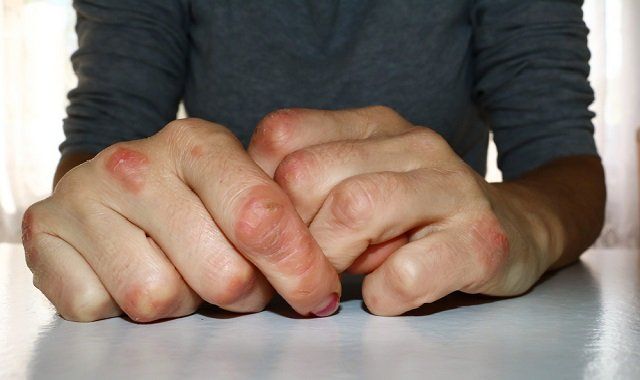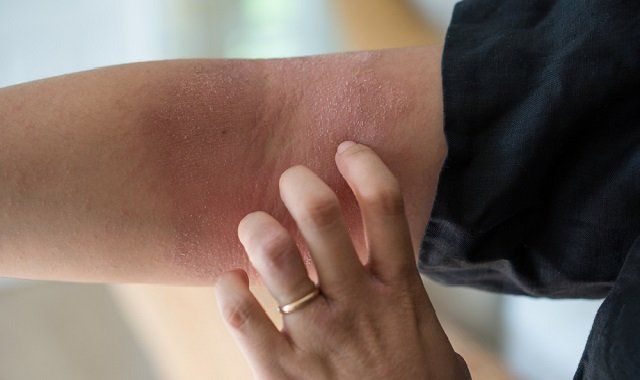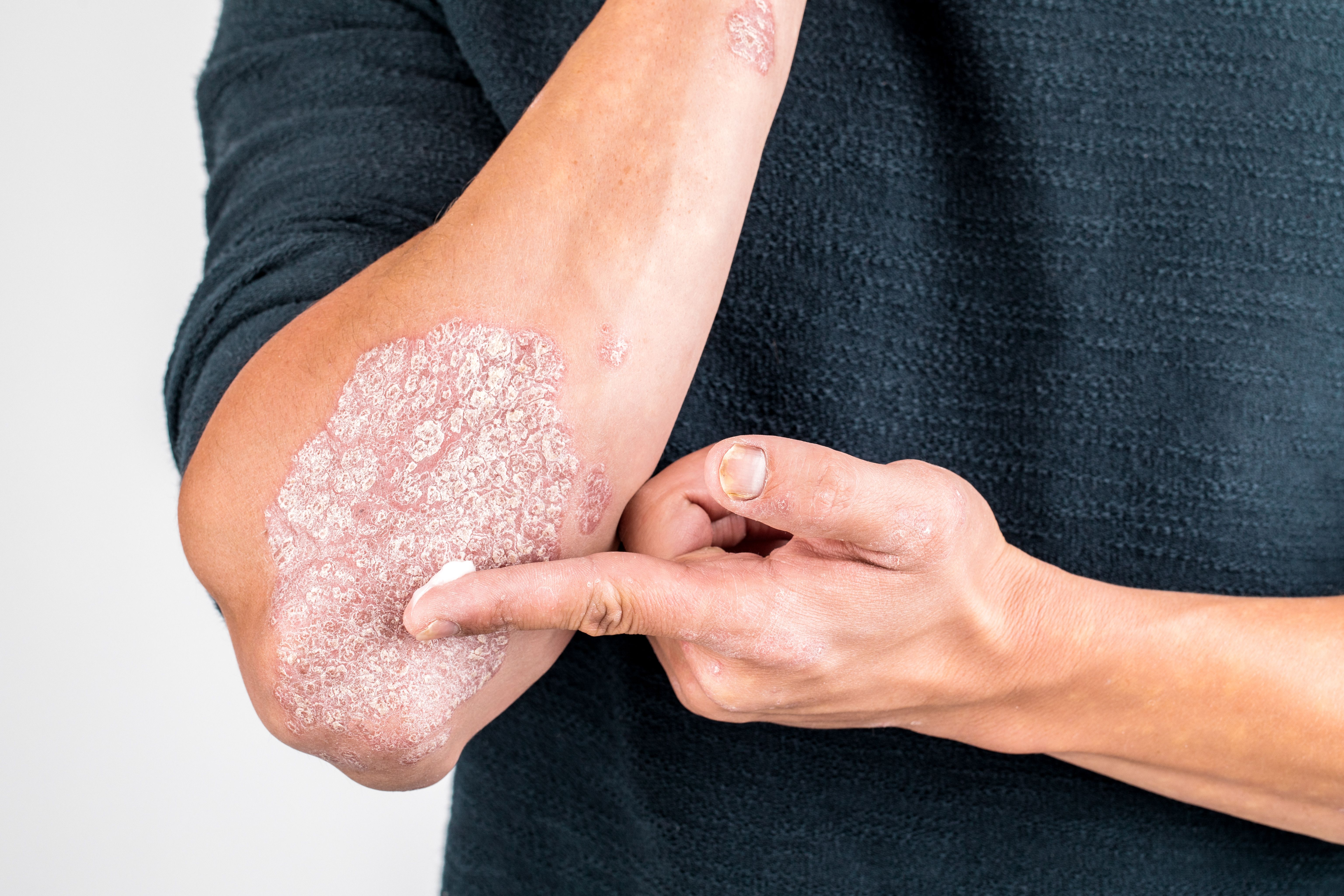- Case-Based Roundtable
- General Dermatology
- Eczema
- Chronic Hand Eczema
- Alopecia
- Aesthetics
- Vitiligo
- COVID-19
- Actinic Keratosis
- Precision Medicine and Biologics
- Rare Disease
- Wound Care
- Rosacea
- Psoriasis
- Psoriatic Arthritis
- Atopic Dermatitis
- Melasma
- NP and PA
- Skin Cancer
- Hidradenitis Suppurativa
- Drug Watch
- Pigmentary Disorders
- Acne
- Pediatric Dermatology
- Practice Management
- Prurigo Nodularis
- Buy-and-Bill
Article
Psoriasis patient point of view
Author(s):
Survey highlights the challenges of controlling psoriasis flares.

(Cillian9Shutterstock.com)
Almost two-thirds of patients with psoriasis have never gone into remission, shows a survey conducted by the health advocacy group Health Union.
The 100-question national survey, which was conducted in the spring of 2017, included 1,016 adults (mean age 53; 90% female) who were diagnosed with plaque psoriasis (75%), psoriatic arthritis (49%), nail psoriasis(30%) and guttate psoriasis (13%).
The survey showed that psoriasis and psoriatic arthritis have proven to be difficult conditions to control with 99% of patients experiencing symptoms within the last three months. 86% of patients feel that stress and anxiety were responsible for their condition and 98% percent of patients want more information from their doctor about disease management.
In this slideshow, we highlight some of the findings:


(Photographee.euShutterstock.com)
HEALTHCARE PROVIDER INTERACTIONS
49% of respondents were “very comfortable” speaking with their healthcare provider. Switching medications and managing flares were most commonly discussed. There was a strong interest in clinical trials, medications and treatments, skin care tips, complications, and symptom management.
- 63% were diagnosed by a dermatologist; but 43% were currently under the care of a dermatologist.
- 21% were diagnosed by a primary care, internal medicine or family physician with 12% under the care of these specialists.
- 10% were diagnosed by a rheumatologist, but 20% were currently under the care of a rheumatologist.
- 2% were diagnosed by a nurse practitioner/physician assistant and 3% continued to see a nurse practitioner post diagnosis.
- 1% were diagnosed by other healthcare professionals with .4% continuing to be treated by this group.
- .4% were diagnosed by a specialist in alternative/holistic medicine and 1% of patients preferred to be treated by specialists in this group.
- 60% were satisfied with their provider
- 98% wanted more information about disease management at the time of diagnosis.
- 75% rely on their healthcare provider for information, with patients specifically looking for information on:
- Comorbidities
- Eye problems
- OTC medications
- Psoriatic arthritis
- How to achieve remission
- Medication side effects



(SattahipbeachShutterstock.com)
SYMPTOMS
Stress and anxiety prompted psoriasis in 86% of cases. 17% of respondents were diagnosed before age 15. Less than ½ of respondents started out with mild psoriasis, which covered less than 3% of their body; typically affecting the scalp, elbows or legs.
INITIAL SYMPTOMS
- Itching 62%
- Red patches of skin with silvery scales (plaques) 53%
- Scale/crust/lesions on the scalp 46%
- Dry, cracked skin 44%
- Bright red, smooth, shiny patches of skin 35%
- Pain 30%
- Pink or red spots on skin 9%
AFFECTED BODY AREAS AT DIAGNOSIS
- Scalp 61%
- Elbows 53%
- Legs 6%
- Knees 38%
- Face/ears 35%
- Arms 33%
- Hands 28%
- Torso/trunk 25%
DIAGNOSIS
- Plaque psoriasis 76%
- Psoriatic arthritis 49%
- Nail psoriasis 30%
- Guttate psoriasis 13%
EXISTING SYMPTOMS
Despite treatment, 99% of patients experienced symptoms within the last three months. 53% experience 8 or more flares a year, with flares often lasting longer than a month.
- Itching 81%
- Red patches of skin with silvery scales (plaques) 69%
- Dry, cracked skin 66%
- Fatigue 66%
- Swollen and/or stiff joints 63%
- Pain 58%
- Scale/crust/lesions on the scalp 57%
- Bright red, smooth, shiny patches of skin 50%
- Thickened, pitted, or ridged nails 47%
- Burning sensation on skin 44%



(TuYyoShutterstock.com)
TREATMENT, TRIGGERS, REMISSION
- 47% were started on a prescription medication within a month of diagnosis with methotrexate being the leading traditional systemic medication for trial and usage.
- For 11% of patients, more than 5 years lapsed between diagnosis and receiving prescription medication.
- Only 42 percent of patients have used manufacturer-sponsored discount programs.
TRIGGERS
- Stress/anxiety 86%
- Weather or seasonal changes 65%
- Dry skin 45%
- Illness/being sick 40%
- Injury to the skin (Koebner phenomenon) 34%
- Heat 29%
- Suddenly stopping psoriasis treatment 28%
- Infection 25%
- Diet 23%
- Hormonal changes (monthly cycle/period, menopause, puberty) 21%
REMISSION
- 62% have never gone into remission
- 6% were currently in remission
- 31% went into remission, but psoriasis recurred
- Among those who experienced remission, for 33% it lasted up to six months; up to one year for 22%; and, up to three years for 19%
- Remission was attributed to biologics in 36% of cases, topical medications in 30% of cases and the disease resolved on its own in 26% of cases.



(KheiraBenkadaShutterstock.com)
COMORBIDITIES
- 93% of respondents had other comorbidities
- Overweight/obese 53%
- Hypertension 42%
- Anxiety or panic disorders 39%
- Osteoarthritis 39%
- Elevated cholesterol/triglycerides 30%
- Depression and Bipolar 30%
- Migraines 27%
- Chronic pain 22%
- Irritable bowel syndrome 22%
OTHER COMPLICATIONS
- Psoriatic arthritis 72%
- Arthritis/swollen joints 68%
- Eye disorders/issues (uveitis, blepharitis) 17%
- Periodontal disease 15%
- Sexual dysfunction 13%
- Nonmelanoma skin cancer 3%
- Sclerosis 2%
- Lymphoma 1%
- Other complication (not listed) 15%
DISEASE CONTROL
- Almost two-thirds of respondents had never gone into remission, and most of those who did experienced disease reactivation within 1 year.
- Only 27% of respondents were satisfied with their current treatment plan.
- Side effects and cost were common issues affecting medication use.
- Fifty-seven percent of respondents had asked their HCP for a less expensive medication.
- Medication compliance/persistence emerged as an issue.
- Fifty-seven percent of respondents indicated they had failed to fill or refill a prescription.
REFERENCE
Psoriasis in America, June 2017. Health Union, LLC. https://health-union.com/






